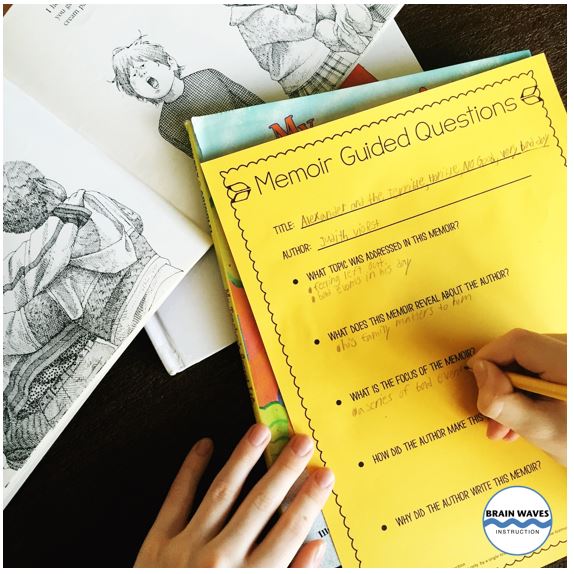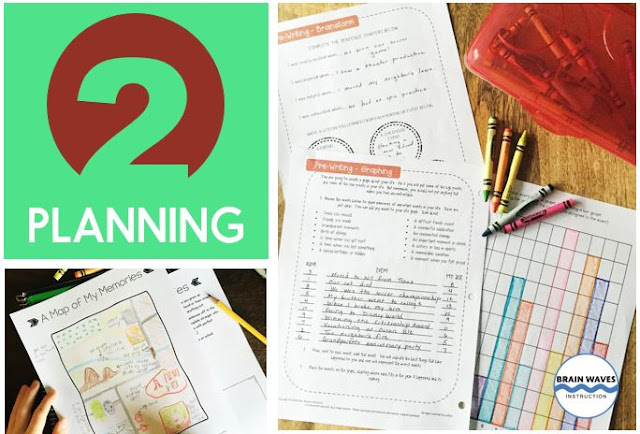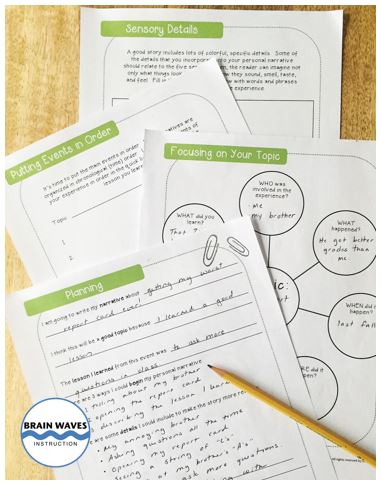Since today's post is all about secrets, I thought I'd start with one of my own: I didn't always enjoy teaching writing. It's true, while I had high hopes of being an amazing writing teacher when I first started my career, I found that despite my teaching attempts, my students were producing pretty lame writing pieces, and it wasn't their fault. Early on, even though I was following the writing process just as it had been prescribed to me, my students were failing.
Teaching writing was no fun....until, I discovered the 3 secrets of fantastic writing instruction. Once I figured out the 3 critical ways to turn my reluctant writers into enthusiastic authors, my entire outlook on writing changed. These days I love teaching writing, my students produce amazing writing pieces and it's all thanks to these 3 secrets...
Secret #1 - Mentor Texts
The first secret to fantastic writing instruction is reading! That's right, great readers become great writers. That's why I love exposing students to mentor texts BEFORE they begin writing. When teaching a unit on Memoir Writing, I love to gather a huge collection of memoir children's books. Then, during the first days of the unit students read a bunch of different books and answer guided questions about memoirs.
Next, they work with a small group to determine unifying characteristics of the memoirs that they read. Finally, we discuss the genre as a class and students' develop a huge list of critical characteristics of memoirs. Their exploration into mentor texts provides an extremely strong basis for their own writing. If you're teaching a Memoir Writing Unit you might consider exposing students to the children's books by Tomie dePaola.
Sometimes, I write my own version of the mentor text. I actually progress through the entire writing unit myself, first, and then create a writing piece that includes everything I want students to include in their own piece. At the start of the unit, I have students review the sample that I wrote and chart examples of critical elements of the genre on a graphic organizer. I include the mentor text right in students' writing packets so that they can reference it during the unit.
 |
| Here's an example mentor text that I wrote for a Descriptive Writing Unit. |
I like to couple writing units with my reading units. So, after we study Native American myths, I have students write their own myth. Once students have compared and contrasted multiple variations of fables, they write their own fable.
Another way to expose students to mentor texts is to read aloud samples throughout the entire writing unit. I like to start each of the lessons during the Memoir Writing Unit with a short memoir from the book Guys Write for Guys Read. It's filled with funny stories that showcase the genre and craft of writing.
When students have a true understanding of the genre they will be writing, they have a solid foundation for the unit. Oh, and don't forget to save student exemplars. They make the very best samples. My students LOVE when I share poems written by former students before they write their own poems. It shows them that if others can do it, so can they!
Secret #2 - Planning
Rather than hop right into drafting a writing piece, I love to give students a ton of ways to brainstorm topic ideas and plan their writing. With a solid topic and plan, the actual writing is SO much easier for students...and we all know that when it's less of a struggle, it's way more enjoyable.
I like to spend a class period or two devoted to giving students an opportunity to determine a topic and begin to plan out their first draft. It's important to me that students spend time flushing out ideas for what to write about. I want them to have a strong topic before they begin writing anything. To generate topic ideas I like to have students...
--- Make word webs or lists
--- Meet with peers and chat about potential topics
--- Sketch scenes from their past
--- Chart and graph significant life events
--- Conduct mini-research projects
--- Interview family members
There are so many fun ways to get students thinking about writing topics. I also love providing students with writing journals filled with engaging prompts that they can complete before starting their own writing piece. The prompts are designed to get students thinking and to jog their memories. Then, when it's time to think of significant life events, they can review their journals and find a ton of ideas. This works particularly well for Narrative Writing and Memoir Writing.
After students have a topic idea, I have them PLAN even more. We spend at least a class period gathering and collecting more details about their topic ideas. Often students complete graphic organizers about the sequence of events, plot, setting, and theme. In the Persuasive Writing Unit, students complete "because statements" and plan out propaganda techniques and figurative language before starting the rough draft.
I've found that planning is one of the most critical elements to fantastic writing instruction. When students have a strong topic, a solid plan, and a list of ideas, the rough draft spills out of them. There's no more, "I don't know what to write." Instead, there's a whole lot of, "This is so fun!"
Secret #3 - Mini-Lessons
Don't you just love a mini-lesson? I do! They're the perfect way to teach students critical skills without taking too much time...and they're the final secret to fantastic writing instruction. I fill my writing units with mini-lessons for students during the REVISING stage of writing. I've found that the real writing happens when students start RE-writing and revising.
However, often students don't want to rewrite their work. Many are happen to claim their first draft as perfection. That's why I force their hand, so to speak, with revision mini-lessons. Each mini-lesson addresses a particular writing skill anything from transitions to voice to word choice. During the mini-lesson they learn about the skill and then practice it with their own writing. Finally, they're required to go back to their first drafts and insert their new and improved writing.
Mini-lessons are the key to getting students to take their writing to the next level. If you pack your writing instruction with revising mini-lessons it won't take long for the culture of your classroom to change. Revising has become one of my students' favorite phases of the writing process. In fact, when students share their improvements they often try to outdo each other. We celebrate a culture of improving. Mini-lessons make revising manageable and the impact on students' writing is astounding.
There you have it, 3 secrets of fantastic writing instruction. However, I think there's one more secret. The ultimate secret is this: MAKE WRITING FUN. The very best way to do that is to set students up for success. Provide them with a solid understanding of the genre with mentor texts. Help them select the very best topic and create plans for their writing. Guide them through improving their work. The end result will not only be amazing writing pieces, but a classroom full of students who are genuinely proud of their work.
Thanks for stopping by,
Mary Beth
P.S. As you can tell, teaching writing is my jam. If you'd like some turn-key writing units for your classroom, you can find a wide selection HERE.
 |
| Here's just a few of my favorite units: Narrative Writing Unit, Myth Writing Unit, Persuasive Writing Unit, Memoir Writing Unit, Speeches Writing Unit, Expository Writing Unit, Biography Writing Unit, Descriptive Writing Unit |











The eye drops help those who have less amount of eyelashes. It makes them darker and even thicker.
ReplyDeleteBuy Bimat 3ml
Buy Careprost Eye drops
Orligal 120 is a medication that functions by absorbing the fat in the food that you consume. The fat in your body that remains undigested is secreted out.
ReplyDeleteBuy Orligal 120
Careprost 3ml eye drops are an effective medication for treating elevated pressure in the eyes. The major active ingredient utilised here is bimatoprost (3 mL). This increased pressure in the eyes causes glaucoma, a disease in which the optic nerve is injured and the pressure rises under abnormal conditions. If the pressure in the eyes remains high, the optic nerve in the eye may be destroyed, resulting in blindness in rare cases. As a result, the fluid in the eye increases, causing the pressure to stabilise and decrease.Do not take this medication if your hands are soiled.
ReplyDeleteforeverlivigmedss